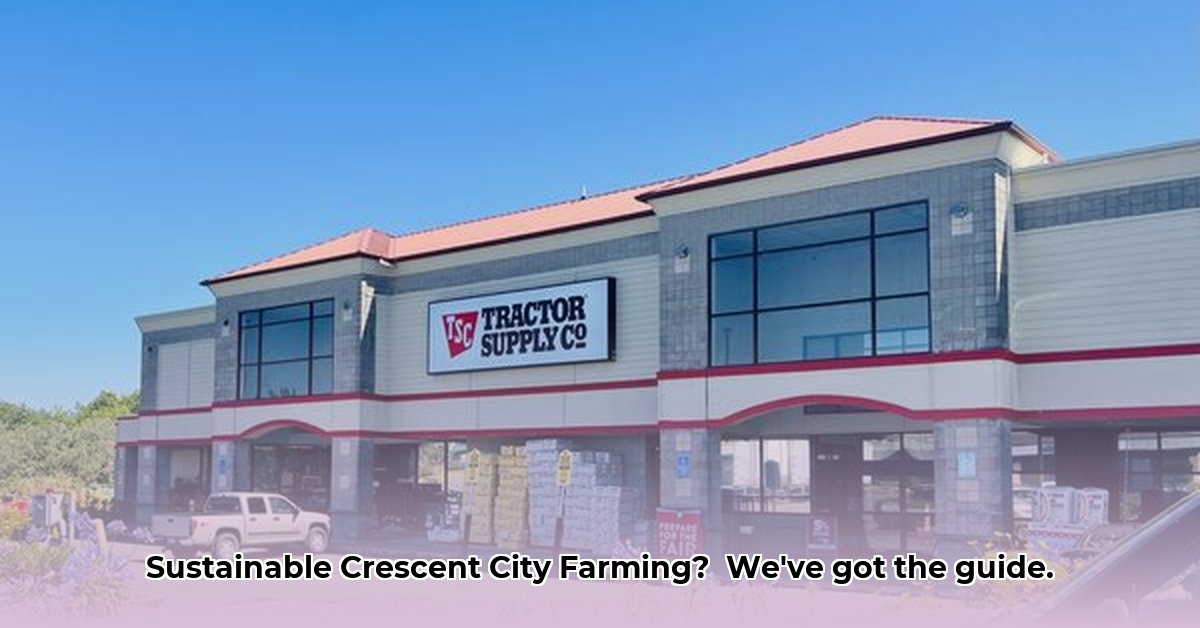
Tractor Supply Crescent City CA: Partnering in Sustainable Agriculture
Farming in Crescent City, whether a large-scale operation or a backyard garden, requires the right resources. Tractor Supply Company (TSC) offers a readily accessible source for tools, supplies, and equipment, from fencing and animal care products to gardening essentials and lawn maintenance equipment. But beyond convenience, how does TSC contribute to sustainable agriculture in Crescent City? This article explores TSC's role, highlighting both its contributions and limitations. We'll examine the experiences of local farmers and provide actionable steps for a greener farming future. Learn more about TSC's sustainability initiatives here.
More Than Just a Store: TSC's Complex Role in Sustainability
TSC's contribution to sustainable agriculture in Crescent City is multifaceted. While not exclusively focused on certified organic products, many of their offerings support environmentally conscious practices. For example, they stock water-efficient irrigation systems, helping conserve a precious resource. Livestock feed options promote animal welfare, influencing overall farm productivity. Gardening tools enhance the efficiency and effectiveness of local food production. However, the extent of TSC’s impact on large-scale sustainable farming remains a topic of ongoing discussion.
"While Tractor Supply provides many essential items for sustainable practices, more transparency regarding their sourcing and supply chain is crucial for a complete assessment of their influence," says Dr. Emily Carter, Professor of Agricultural Sustainability, Humboldt State University.
Your Steps Towards Sustainable Farming with TSC
Ready to make your farm or garden more environmentally friendly? Here's a practical roadmap leveraging TSC's resources:
Informed Shopping: Carefully examine product labels at TSC. Look for clues like reduced packaging, recycled materials, or responsible sourcing information. These small choices collectively contribute to environmental stewardship.
Utilize Staff Expertise: Engage with TSC staff. They're a valuable resource for information on eco-friendly alternatives to conventional methods, such as organic fertilizers or sustainable pest management strategies. Their insights can significantly enhance your sustainability efforts.
Community Building: Connect with other gardeners and farmers. Share experiences, learn from others, and build a supportive community. Farmers' markets and local gardening groups are excellent places to network.
Voice Your Preferences: Let TSC know that you value sustainable products. Request expanded offerings of eco-friendly options. Your feedback influences their inventory decisions and demonstrates community demand for sustainable choices.
A Balanced Perspective: TSC's Contributions and Limitations
While TSC benefits individual gardeners and smaller farms, its overall influence on large-scale sustainable practices requires further investigation. The availability of certified organic or similarly designated products needs closer scrutiny. Dr. Carter adds, "The accessibility of TSC is a positive factor, but a complete picture regarding their role in truly sustainable, large-scale farming requires further analysis of their supply chain and partnerships."
Addressing Potential Risks: A Proactive Approach
Sustainable farming presents challenges. TSC, by offering a broad range of products, both contributes to and can help mitigate these risks:
| Technology/Practice | Potential Risk | Mitigation Strategies |
|---|---|---|
| Conventional Animal Feed | Environmental impact (nutrient runoff), animal welfare | Choose feed with lower environmental impact, prioritize options supporting responsible animal welfare. |
| Chemical Fertilizers/Pesticides | Environmental and human health risks | Explore organic alternatives, implement safe and sustainable application methods. |
| Single-Use Plastics | Waste generation and pollution | Opt for products with reduced or reusable packaging; support recycling initiatives. |
| Wood Products | Unsustainable forestry practices | Seek out wood products sourced from certified sustainable forests. |
Collaboration for a Sustainable Future
Achieving sustainable farming in Crescent City demands a collaborative effort—individual choices, community initiatives, and active engagement from businesses like TSC. Their role will evolve as consumer demand for sustainable products increases and agricultural best practices advance. By working together, we can build a healthier, more environmentally conscious future.
Sourcing Sustainable Farming Supplies from Tractor Supply Crescent City
Key Takeaways:
- TSC in Crescent City offers various products useful for sustainable farming practices.
- TSC's primary impact on sustainable agriculture is localized to smaller farms and home gardeners.
- Greater transparency from TSC regarding their sustainability initiatives is necessary.
- Local farmers and gardeners can actively contribute to a more sustainable agricultural system.
Finding sustainable supplies at TSC involves informed decision-making. While not explicitly promoting "sustainable" branding, TSC provides many essential products for environmentally conscious farming. This includes durable tools, locally sourced feed (where available), and pest control methods with minimal environmental impact.
TSC's Offerings and Limitations
TSC provides the tools; sustainable application is the responsibility of the consumer. While they offer a range of products, a critical limitation is the lack of readily apparent information on the sustainability of their sourcing practices and overall environmental impact. The company needs to improve transparency in communicating its environmental stewardship.
Taking Action: Your Role and TSC's Role
Consumers: Research product origins and environmental impact. Look for certifications, and inquire with TSC staff about sustainability practices. Advocate for change by expressing your preference for sustainable products. Support local producers.
TSC: Increase transparency with sustainability reports. Expand sustainable offerings, and invest in store-level initiatives reducing waste and energy consumption. Through collaborative efforts, Crescent City can become a hub for thriving, sustainable agriculture.